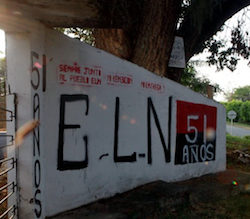A Colombian guerrilla group has reportedly kidnapped nearly a dozen rice farmers and is holding them hostage in Venezuela, a sign of increasing militant activity along the border that could have implications for an ongoing peace process.
According to local media accounts, the National Liberation Army (Ejercito de Liberacion Nacional – ELN) has kidnapped 11 rice farmers who had been working in the department of Arauca. The farmers are reportedly being held by the ELN across the border in Venezuela, where the guerrillas are demanding large ransoms in exchange for their release.
Co-workers of the kidnapped farmers said that the ELN had recently raised the amount of extortion payments they demanded from around 70,000 pesos (about $24) per hectare to 300,000 pesos (roughly $100) per hectare for local residents of Arauca, and as much as 600,000 pesos (about $200) per hectare for those who are not from the area.
The sources, who requested anonymity for fear of reprisals from the ELN, said that the kidnapped farmers did not live in Arauca, but they worked there. They were reportedly taken by the guerrilla group when they traveled over the border into Venezuela in order to make extortion payments.
It remains unclear whether all eleven victims were kidnapped at once or at separate times. Venezuelan authorities have not publicly commented on the issue, and Colombian officials have remained similarly quiet.
Arauca Gov. Ricardo Alvarado Bestene convened an emergency security meeting which resulted in the release of a statement on August 16 that promised that “authorities will improve their military strategies to guarantee security and the right to work.” Alvarado also called for the release of anyone who may have been kidnapped and condemned such actions.
InSight Crime Analysis
The ELN has long maintained a presence in Arauca and the neighboring Venezuelan state of Apure. But the group’s use of Venezuelan territory as a refuge and base of operations appears to have grown in recent years. During field research conducted in 2011, InSight Crime learned that it was common knowledge in Arauca that the ELN ran an “office” to collect extortion payments just across the border in Apure.
More recently, a prominent Venezuelan professor, Javier Tarazona, has warned that the ELN appears to be ramping up propaganda and recruitment efforts in rural Venezuelan communities near the Colombian border. The professor links this development to political corruption and economic distress in these areas, which he says encourage public officials and struggling residents to cooperate with armed groups.
SEE ALSO: Coverage of the ELN
Tarazona also indicated that ongoing peace talks between the Colombian government and the country’s two main guerrilla groups — the ELN and the Revolutionary Armed Forces of Colombia (Fuerzas Armadas Revolucionarias de Colombia – FARC) — could play a role in the apparent increase in militant activities in Venezuela. Despite significant challenges going forward, the peace talks with the FARC appear to be nearing a final agreement, while negotiations with the ELN are on much less certain footing. The rebel group’s refusal to stop kidnapping people as a precondition to further talks is one issue blocking progress.
Guerrillas who want to continue illegal activities that they would be expected to give up in the event of a peace agreement may be relocating their operations to areas where Colombian authorities lack jurisdiction. Evidence of this dynamic has also been observed recently in areas of Ecuador near that country’s eastern border with Colombia.

